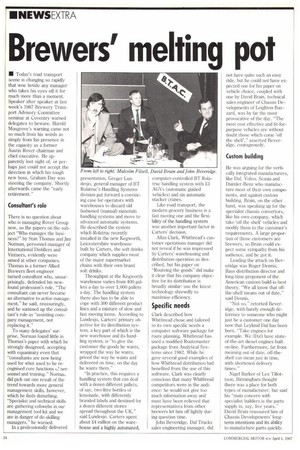Brewers' melting pot
Page 26

If you've noticed an error in this article please click here to report it so we can fix it.
• Today's road transport scene is changing so rapidly that woe betide any manager who takes his eyes off it for much more than a moment. Speaker after speaker at last week's 1987 Brewery Transport Advisory Committee seminar at Coventry warned delegates to beware. Harold Musgrove's warning came not so much from his words as simply from his presence in the capacity as a former Austin Rover chairman and chief executive. He apparently lost sight of, or perhaps just could not accept the direction in which his tough new boss, Graham Day was steering the company. Shortly afterwards came the "early retirement."
Consultant's role
There is no question about who is managing Rover Group now, so the papers on the subject "Who manages the business?" by Stan Thomas and Jim Norman, personnel manager of International Distillers and Vintners, evidently were aimed at other companies. Thomas is a former Allied Brewers fleet engineer turned consultant who, unsurprisingly, defended his newfound profession's role. "The consultant can never become an alternative to active management," he said, reassuringly, and he summed up the consultant's role as "assisting company management, not replacing it,"
To many delegates' surprise, Norman found little in Thomas's paper with which he strongly disagreed, accepting with equanimity even that "consultants are now being used for what used to be recognised core functions uf uersonnet and training." Normal. did pick out one result of the trend towards more general management skills, however, which he finds disturbing. "Specialist and technical skills are gathering cobwebs in our management tool kit and we are in danger of de-skilling managers," he warned.
In a professionally delivered
presentation, Greger Lundesjo, general manager of BT Rolatruc's Handling Systems division put forward a convincing case for operators with warehouses to discard old fashioned (manual) materials handling systems and move to advanced automatic systems. He described the system which Rolatruc recently installed in the new Kegworth, Leicestershire warehouse built by Carters, the soft drinks company which supplies most of the major supermarket chains with their own brand soft drinks.
Throughput at the Kegworth warehouse varies from 400 pallets a day to over 1,000 pallets a day. The handling system there also has to be able to cope with 300 different product lines and a mixture of slow and fast moving items. According to Lundesjo, Carters' primary objective for its distribution system, a key part of which is the new warehouse and its handling system, is "to give the customer the goods he wants, wrapped the way he wants, priced the way he wants and delivered on time, on the day he wants them."
"In practice, this requires a handling system that can deal with a dozen different pallets, of say, two-litre bottles of lemonade, with differently branded labels and destined for a dozen different stores spread throughout the UK," said Lundesjo. Carters spent about £4 million on the warehouse and a highly automated, computer-controlled BT Rolatruc handling system with 13 AGVs (automatic guided vehicles) and six automatic stacker cranes.
Like road transport, the modern grocery business is a fast moving one and the flexibility of the handling system was another important factor in Carters' decision.
Allan Clark, Whitbread's customer operations manager did not reveal if he was impressed by Carters' warehousing and distribution operation as described, but his paper on "Routeing the goods" did make it clear that his company objective for its distribution is broadly similar: use the latest technology shrewdly to maximise efficiency.
Specific needs
Clark described how Whitbread chose and tailored to its own specific needs a computer software package for route planning. Whitbread has used a modified Routemaster package from Analytical Systems since 1982. While he gave several good examples of how Whitbread distribution had benefited from the use of this software, Clark was clearly conscious that many Whitbread competitors were in the audience: he would not give too much information away and must have been relieved that representatives from other brewers let him off lightly during question time.
John Beveridge, Daf Trucks sales engineering manager, did not have quite such an easy ride, but he could not have expected one for his paper on vehicle choice, coupled with one by David Brain, technical sales engineer of Chassis Developments of Leighton Buzzard, was by far the most provocative of the day. "The most cost effective and fit-forpurpose vehicles are without doubt those which come 'off the shelf," asserted Beveridge, courageously.
Custom building He was arguing for the vertically integrated manufacturers, like Daf, Volvo, Scania and Daimler-Benz who manufacture most of their own components, and against custom building. Brain, on the other hand, was speaking up for the specialist chassis convertors, like his own company, which take 'off the shelf vehicles and modify them to the customer's requirements. A large proportion of those customers are brewers, so Brain could expect some sympathy from his audience, and he got it.
Leading the attack on Beveridge was Roger Dennis, Bass distribution director and long-time proponent of the American custom-build-is-best theory. "We all know that offthe-shelf means out of date," said Dennis.
"Not so," retorted Beveridge, with barely enough deference to someone who might just be a customer one day now that Leyland Daf has been born. "Take engines for example. We (Daf) have stateof-the-art diesel engines built on-line. Furthermore, far from meaning out of date, off-theshelf can mean just in time, with shortened delivery times."
Nigel Barker of Lex Tillottson, Birmingham thought there was a place for both types of manufacturer, but said his "main concern with specialist builders is the parts supply in, say, five years." David Brain reassured him of Chassis Developments' longterm intentions and its ability to manufacture parts quickly.




















































































